Key Headlines
- There has been a record number of core-STEM A-Levels achieved this year, with a 2.5% increase in the number of female core-STEM entries.
- However, the percentage of female core-STEM entries overall remains stable at around 43%.
- Computing A-Level entries continue to grow – a 17.6% increase in female entrants compared to 2022.
- Science subjects remain popular – showing a growth in entries in Biology and Chemistry, but a drop in Physics.
- Mathematics remains the most popular subject representing 11.2% of all A-Level entries.
Overview of Core-STEM A-Levels
Despite a record number of core-STEM A-Levels achieved this year and a 2.5% increase in the number of female core-STEM entries, the proportion of female entries remains stable at around 43%.
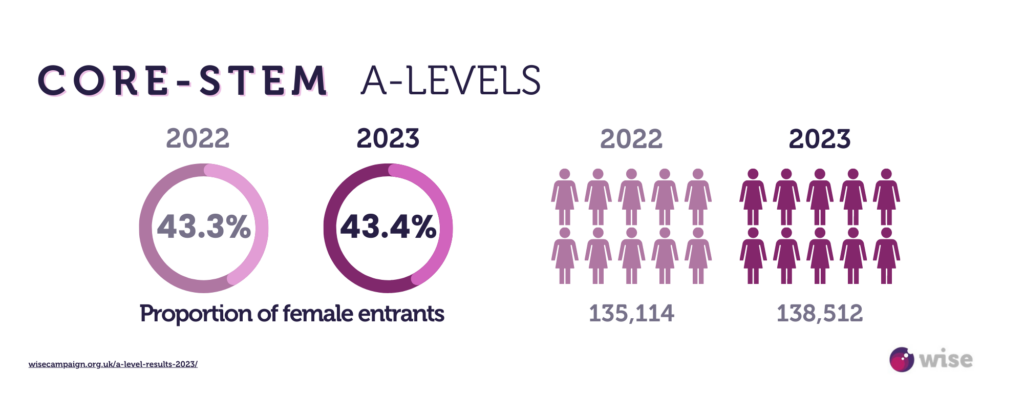
The gap between male and female entries for core-STEM subjects is closing, albeit too slowly. 2023 saw a 2.5% increase in the number of core-STEM A-Levels taken by female entries. This included increases in Biology, Chemistry, Computing, ICT and Mathematics. However, data trends reflect the larger total number of A-Levels entries for 2023 than in previous years. This year, core-STEM subjects accounted for 29.4% of all female A-Level entries, compared to 45.6% for male A-Level entries.
Computing A-Level
Computing A-Level continues to attract more entrants – a 17.6% increase in female entrants compared to 2022.
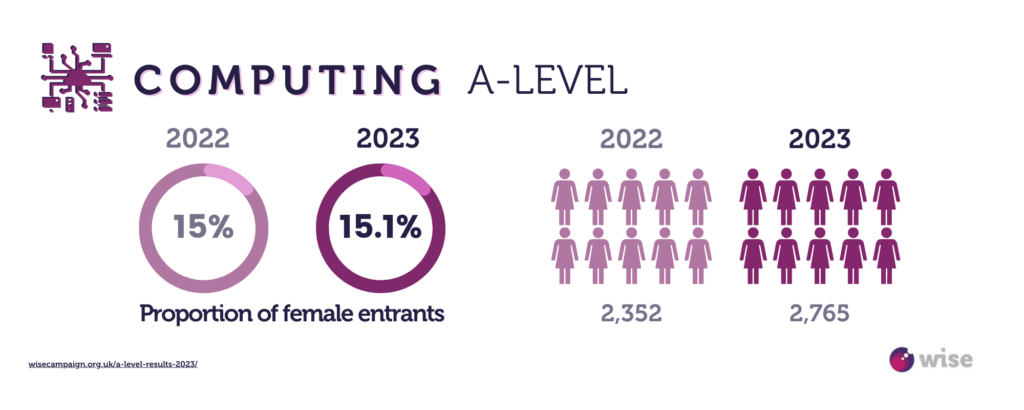
We are encouraged to see an increase in the number of female entrants for the Computing A-Level. Whilst numbers attracted to Computing remain rather low overall, especially in comparison with core-STEM subjects such as Biology and Physics, there has been a 17.6% proportional increase in female entrants, compared to 2022. In 2023, female entries for the Computing A-Levels rose to 15.1% – the actual number of female A-Level entries has more than doubled since 2019.
This data suggests that still more work is needed in the future to ensure the inclusion of women and girls with the subject.
Science Subjects
Science A-Level subjects remain some of the most popular with Biology, Chemistry & Physics being the 3rd, 4th and 10th most popular A-Levels overall. Alongside the increase in the number of core-STEM A-Levels taken by female entries overall, there was a notable increase in the female entrants for Biology & Chemistry.
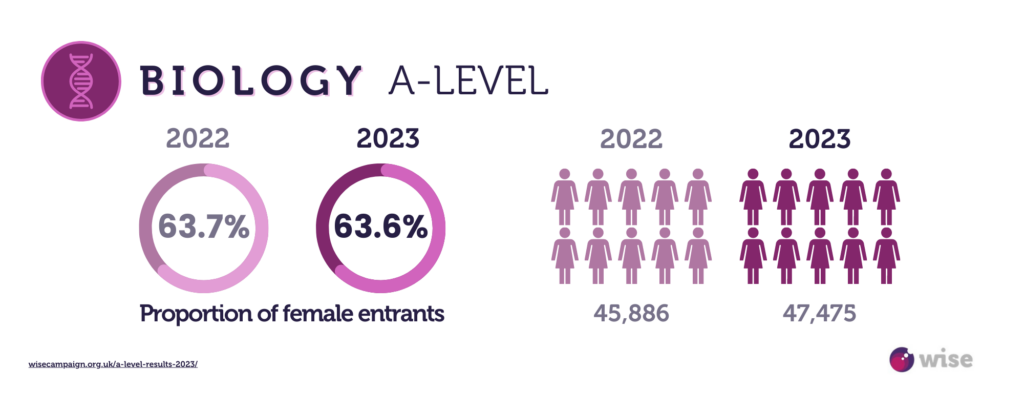
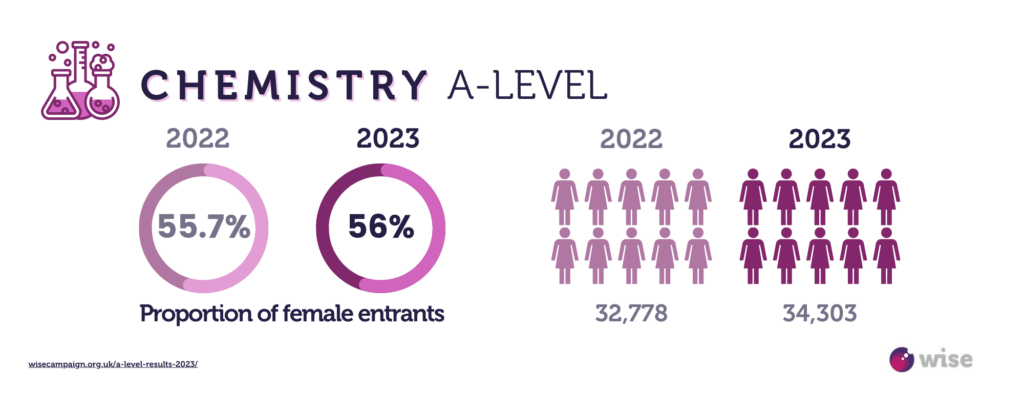
Biology continues to be the most popular A Level for female entries by some distance. The percentage of female entries for the Biology A Level has reached an impressive 63.6%. For Chemistry A-Levels, female entries also make up over half of the total (56%), up from 53.7% in 2019.
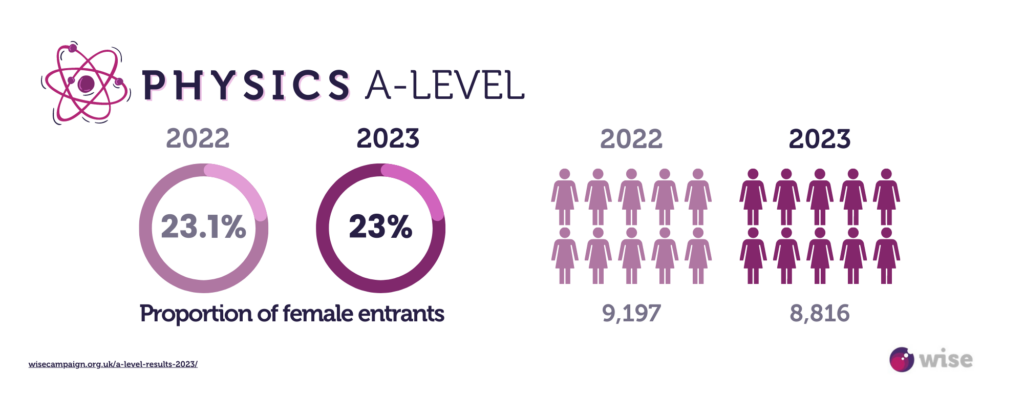
However, 2023 A-Levels results show a drop of 4.1% in the number of Physics female A-Level entries. This year, only 23% of all Physics A-Level entries were from female students. More work is needed to ensure that Physics does not get left behind in terms of gender progress and parity.
Mathematics A-Level
Once again, Mathematics remains the most popular core-STEM A-Level by some distance, representing 11.2% of all A-Level entries. This year female entries make up 37.7% of the total, with a 1.1% increase in the total percentage of female applicants.
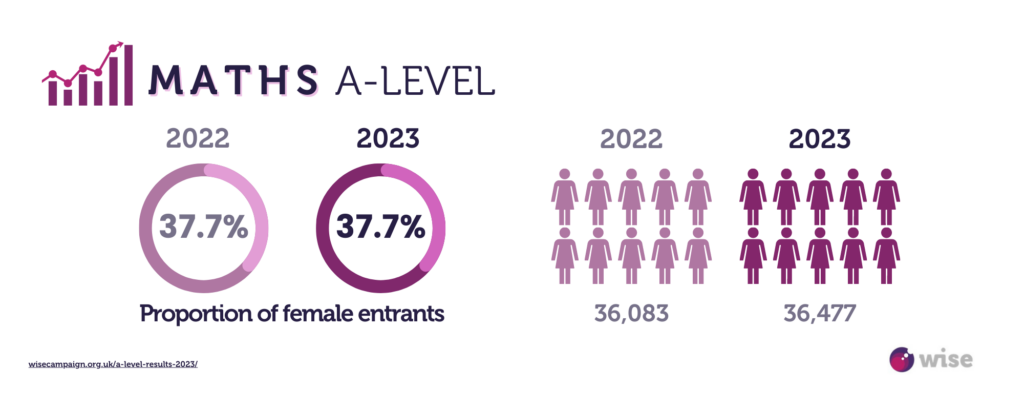
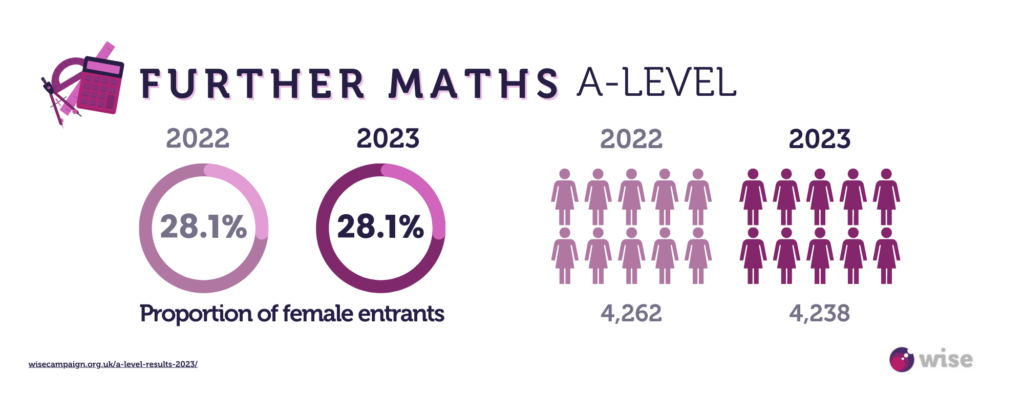
A-Levels 2023 – Top Grades
The following statistics show the number of female entrants achieving the top grades in A-Level STEM subjects:
Biology: Female entrants in biology outperformed male entrants. 27.3% of female entrants were awarded A or A*, an increase from 25.0% in 2019.
Chemistry: 29.9% of female entrants were awarded A or A*, an increase of 2.2% since 2019.
Computing: Female entrants outperformed male entrants in computing, achieving more A or A* and A*-C grades overall. 25% of female entrants were were awarded A or A*, an increase of 6.3% from 2019.
Design and Technology: 23.5% of female entrants in Design and Technology were awarded A or A*, an increase of 2.8% since 2029.
ICT: 29.4% of female entrants in ICT were awarded A or A*, an increase of 8% since 2019. Female entrants in ICT outperformed male entrants.
Mathematics: 40.9% of female entrants were awarded A or A*, a 1.8% decrease from 2019.
Further Mathematics: 55.4% of female entrants were awarded A or A*, a 4.4% increase from 2019.
Physics: 30.2% of female entrants were awarded A or A*, an increase of 1.5% from 2019. This compared to 32.1% of male entrants who were awarded A or A*. Overall, however, female entrants outperformed their male counterparts, 69.8% of female entrants were awarded A*-C grades overall (compared to 69.1% of male entrants).
Other Sciences: 24% of female entrants were awarded A or A*, an increase of 4.6% from 2019.

WISE CEO Kay Hussain commented that the shortage of girls across STEM subjects is a symptom of a deeper problem, a systemic condition which is rife in our culture, our education system and our workforce.
She said that it can only be effectively treated “if we acknowledge and commence treatment at the source, which is of course the education system.”
Read the full news story here.
Get in Touch with WISE
WISE exists to deliver women-centred equity, diversity and inclusion to the STEM sectors, with many leading UK organisations improving their gender balance through membership.
To speak to someone about membership, email info@wisecampaign.org.uk or visit the membership page for more details.
*Core-STEM A-Level subjects include Biology, Chemistry, Computing, Design & Technology, ICT, Mathematics, Mathematics (Further), Physics and Other Sciences.
